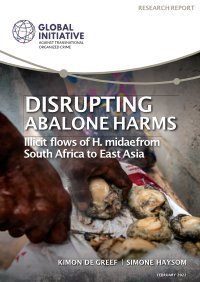Disrupting Abalone Harms: Illicit flows of H. midae from South Africa to East Asia
By Kimon de Greef amd Simone Haysom
Abalone, a variety of marine snail, is valued as a high-status delicacy in East Asia, primarily in China. For more than 30 years, a species of abalone found only in South African waters – Haliotis midae, known locally as perlemoen – has been subjected to massive levels of poaching, driving the evolution of a lucrative and violent criminal economy. This report maps out the profound harms associated with this trade, ranging from resource collapse to corruption, turf wars and the erosion of state institutions. Despite decades of anti-poaching efforts, illegal harvesting is currently at its highest-ever levels, with record prices for abalone, myriad groups competing for profits — from Cape gangsters to Somali smugglers — and few realistic prospects for bringing the trade under control. Faced with these facts, a radical shift to the current state response is needed. Although reports exist of poaching in other countries such as Australia and the US, South Africa has been the global hotspot for abalone poaching since the 1990s. Abalone is harvested by divers, dried in South Africa and smuggled over the border to other southern African states, where it is laundered into licit trade routes and is shipped, primarily, to Hong Kong (the hub of the global abalone trade), from where it enters East Asian consumer markets.
Geneva: Global Initiative Against Transnational Organized Crime, 2022. 62p.


